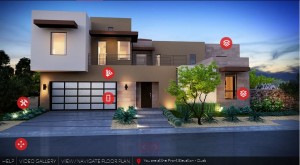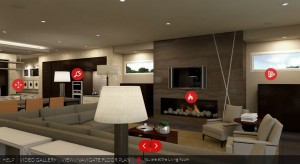With the help of virtual technology, consumers are empowered to make more informed choices about the cars they drive, the universities they attend, and the homes they choose.
For several years now, car buyers have been able to experience sitting at the wheel simply by logging on to the manufacturers’ websites and viewing the interior 360 views. Students can now explore college campuses as if they were there, travelers can “walk through” hotels, and business proprietors can tour office spaces. Other virtual experiences are proliferating across a variety of industries, from clothing and makeup to plastic surgery and pet adoptions.
The stakes are higher for home buyers.
Given the importance of choosing the right home to live, play, entertain, and raise families, the stakes may be much higher in the home building industry. There are simply more criteria for consumers on which to evaluate and compare homes: architecture, design concept, construction quality, livability, floor plans, flow, versatility, and options. With the rise in transplanted workers, an increasing number of buyers will only engage with builders that offer virtual tours.
To add even more weight to the decision, consumers also have to think of homes as assets. Homes are often the single largest investments buyers will make in their lifetimes. If investment option A comes with twice the level of detail and assurance as option B, option A will likely get the nod.
As buying experiences improve, expectations rise.
The rules have changed. Today’s buyers don’t respond to sales tactics as much as they engage with and build trust in brands. That occurs through information and education, and through social sharing and validation from people they trust. Homes aren’t sold just by salespeople anymore; they’re sold by the totality of a buying experience which appeals to both rational and emotional reasons for choosing homes.
If your existing customers aren’t raving about the best home buying experience they have ever had on social media, this is a key indicator that your buying experience must be upgraded.
The decision to implement virtual technology now is pivotal.
For these reasons, virtual technology is well on its way to near-complete market penetration in just a few short years. That inevitability is putting pressure on builders and remodelers now to demonstrate their homes online to local and national buyers, and to real estate investors. Every week, we hear from builders that consumers have seen their competitors’ virtual tours and are no longer interested in conventional floor plan printouts, option lists, and in-person tours of just one or two models. One or two competitors in a local market can quickly and decisively change the competitive landscape when they implement this technology.
Once a buyer experiences being able to interact with and compare models, as well as her options for elevations, floor plans, flooring, finishes, and fixtures in vivid 3-D, along with multiple views, she will likely narrow her list of builders to those that provide this “theater of the mind.” And once a builder sees the increased time buyers spend online engaging with their homes, the quicker decision-making, the higher sales rates, and the increased upgrade sales, the decision is validated.
Virtual tours are the tip of the marketing iceberg for builders. In addition to online model walk-throughs, you can also offer videos, custom home showcases, cutaway homes with hotspots, 3D matterport tours, and guided tours that call out important details about build quality, options, or anything else you choose to feature. The options are wide open and can work within any budget and builder objective.
And the power doesn’t stop once the contract is signed. Online design centers and design center tours can further enhance your experience with a virtual design center and design center tours to prepare your buyer for the design center visit and maximize potential upgrades.
With these immersive experiences and so many more to come, you won’t simply engage buyers’ minds. You’ll engage their hearts.
Want to learn more about the latest virtual technologies and how they can work for your business? Email us at info@thebdx.com.


 Last month as part of the International Builders Show in Las Vegas, I was able to visit the 2014 New American Home®, the 31st edition of the NAHB show home. The home is located in the exclusive foothills of Henderson’s Sky Terrace housing development. The New American Home truly represents all the best things about new homes bringing together the perfect balance of innovative design and cutting-edge technology.
Last month as part of the International Builders Show in Las Vegas, I was able to visit the 2014 New American Home®, the 31st edition of the NAHB show home. The home is located in the exclusive foothills of Henderson’s Sky Terrace housing development. The New American Home truly represents all the best things about new homes bringing together the perfect balance of innovative design and cutting-edge technology.